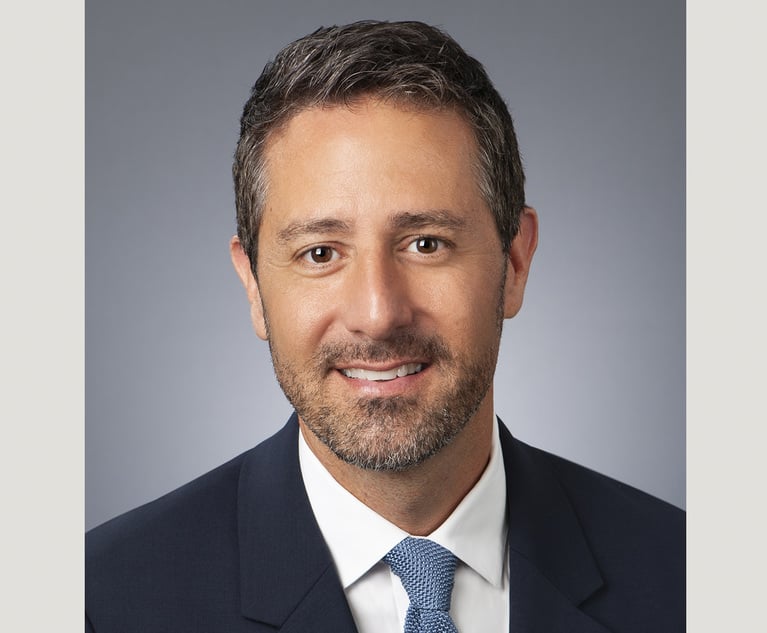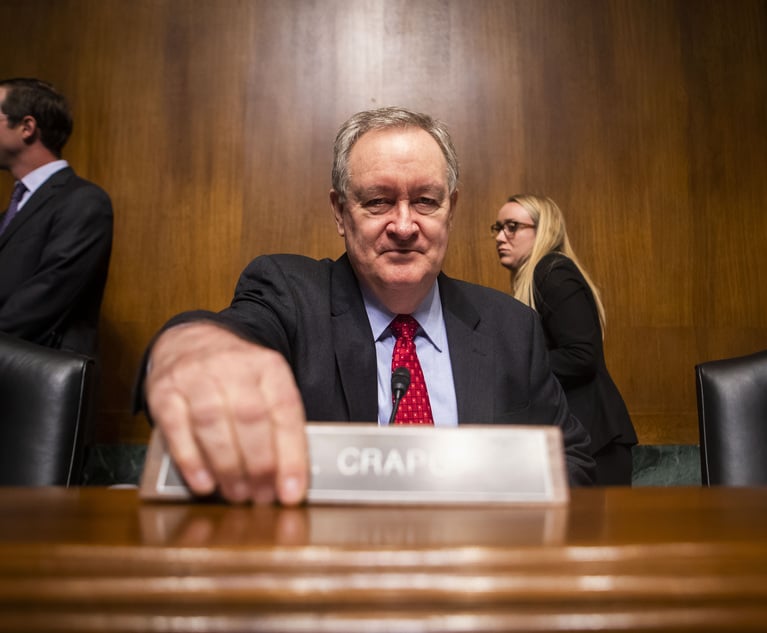New Bill Clears Path for Freelance Attorney Independent Contractor Status
In Assembly Bill 5, the California Legislature ultimately left the freelance legal industry to flourish.
September 11, 2019 at 11:30 PM
7 minute read
 L-R: Laurie G. Rowen, Erin F. Giglia, and Shannon Forchheimer of Montage Legal Group/courtesy photos
L-R: Laurie G. Rowen, Erin F. Giglia, and Shannon Forchheimer of Montage Legal Group/courtesy photos
Worker classification is not a new issue for the California courts, but a landmark decision 18 months ago left a thriving legal industry—the freelance attorney marketplace—questioning its survival. Now, with the California Legislature's passage of Assembly Bill 5, law firms and freelance attorneys can breathe a sigh of relief.
The freelance attorney marketplace is distinct from the traditional notion of contract attorneys who are brought in to law firms for basic litigation support or due diligence. Rather, freelance attorneys represent a previously untapped crop of talent: lawyers who have fled Big Law due to intense work demands and need for a more balanced family life. The freelance attorney model where freelance attorneys work remotely for other law firms has given these attorneys a place to land.
Freelance attorneys have generally been treated as independent contractors. However, the decision set forth in Dynamex Operations West v. Superior Court, 4 Cal. 5th 903 (2018), radically altered 30 years of California worker classification law by using the "ABC Test" instead of the multifactor test set forth under S.G. Borello & Sons v. Department of Industrial Relations, 48 Cal. 3d 341 (1989), and essentially eliminated the independent contractor status for California workers.
Under the ABC test, a worker is presumed to be an employee unless the hiring entity proves that (a) the worker is free from the hiring entity's control; (b) the worker performs work that is outside the usual course of the hiring entity's business; and (c) the worker is customarily engaged in an independent business of the same nature as the work performed for the hiring entity.
The Dynamex decision is intended to shield California workers from misclassification as independent contractors, which provides fewer legal protections for workers than employee status. Worker protection is an important goal, especially for workers earning close to minimum wage, and who value security and protection over flexibility. But blanket application to all workers goes far beyond protection and creates unintended negative consequences for some workers, businesses, and consumers. Certain industries, including licensed professionals and independent business owners, do not logically fall under blanket employee classification because these workers truly run their own businesses, and often cannot maintain those businesses with added employee classification requirements.
The Dynamex decision sent immediate waves of concern throughout the legal industry, though these concerns were tempered by subsequent case law that limited Dynamex to wage orders. See Garcia v. Border Transportation Group, 28 Cal. App. 5th 558 (2018). In an industry where most high-level freelancers work remotely earning well above minimum wage, issues related to working conditions are unlikely to arise. However, there was a general concern that further legislation would codify Dynamex and apply it to all areas of the Labor Code, putting the freelance legal industry in jeopardy, and eliminating the flexibility freelancing provides.
Assembly Bill 5 to the Rescue
Thankfully, AB 5 came to the rescue. While AB5 expands Dynamex, providing much-needed protection for many workers, it will provide specific exemptions for certain industries, including lawyers.
AB 5 has not been without drama. In late 2018, Assembly Member Lorena Gonzales introduced AB 5 to clarify and codify the Dynamex decision, and to expand the case beyond the wage order to include the Labor Code and other provisions. Not surprisingly, gig companies such as Uber, Lyft, and DoorDash pushed to be exempted, but were ultimately unsuccessful. A handful of high-level professional industries that were negatively impacted by Dynamex successfully sought exemptions. After passing in the Assembly, the Senate placed the bill in the suspense file when it lacked agreement on exempted professionals. The bill made it out of the suspense file, was further amended, and ultimately passed on the Assembly floor by a vote of 56-15 on Sept. 11. At the time of publication, the bill's fate sat with Gov. Gavin Newsom, who had publicly expressed support for the bill.
The legislation specifically exempts certain professions, including lawyers, doctors, engineers, and accountants, from the ABC test's reach, and stipulates that "instead, the determination of employee or independent contractor status for individuals in those occupations shall be governed by Borello." See AB-5 Worker status: employees and independent contractors (2019-2020).
This legislation is a clear sign that the Legislature intends to leave freelance attorneys untouched by Dynamex and the ABC test. However, to be considered an independent contractor, freelance attorneys still must satisfy the Borello factors.
Applying Borello to Freelance/Contract Attorneys
The Borello "multifactor," or "economic realities test," has remained unchanged since 1989, but law firms and freelance attorneys should be vigilant in light of increased scrutiny on worker classification.
Under Borello, the most important consideration in determining the employee/independent contractor distinction is the "right to control work details." However, the right to control cannot be viewed in isolation, and there are several additional factors to consider in worker classification. These include whether the alleged employee is engaged in an occupation distinct from that of the principal, who supplies the instrumentalities and tools for the work, whether the services rendered require a special skill, the amount of supervision required, the length of time the services are required, the degree of permanence of the working relationship, and whether the parties believe they are creating an employer–employee relationship.
In light of these factors, there are considerations that law firms and freelance attorneys should recognize to ensure that they remain just that:
- Does the freelance attorney work on-site at the law firm office, or remotely?
- Does the freelance attorney work exclusively for one law firm, or multiple firms?
- Does the freelance attorney set his or her own rate?
- Does the freelance attorney supply his or her own office equipment?
Law firms procuring freelance attorney assistance need to exercise caution, and keep the Borello factors in mind. Freelance legal companies that connect true business owner freelance lawyers with multiple sources of work, where the freelance attorneys set their own rates, work remotely, and supply their own equipment, provide the safest bet. The very thing that attracts attorneys to freelance work—autonomy—is the key to ensuring the industry's survival.
The passage of AB 5 will undoubtedly change the landscape of the gig economy in California. Fortunately, the Legislature has tailored the legislation so that it impacts the people that need it most, and the freelance legal industry has been left free to flourish. As long as law firms and freelance attorneys abide by the Borello factors, legal freelancing remains a viable option for attorneys that want an alternative to the traditional practice model, as well as a significant resource to California law firms.
Erin F. Giglia is co-owner and founder of Montage Legal Group, a freelance attorney platform located in Irvine, California, since 2009. Before co-founding Montage Legal Group, Giglia was a litigator at Snell & Wilmer and Brobeck, Phleger & Harrison. Giglia can be reached at [email protected], @MontageLegal, and at montagelegal.com.
Laurie G. Rowen is co-owner and founder of Montage Legal Group. Before co-founding Montage Legal Group, Rowen was a litigator at Snell & Wilmer. Rowen can be reached at [email protected], @MontageLegal, and at montagelegal.com.
Shannon Forchheimer is a mediator and freelance attorney with Montage Legal Group. Forchheimer previously practiced at Skadden, Arps, Slate, Meagher & Flom and Dickstein Shapiro.
This content has been archived. It is available through our partners, LexisNexis® and Bloomberg Law.
To view this content, please continue to their sites.
Not a Lexis Subscriber?
Subscribe Now
Not a Bloomberg Law Subscriber?
Subscribe Now
NOT FOR REPRINT
© 2025 ALM Global, LLC, All Rights Reserved. Request academic re-use from www.copyright.com. All other uses, submit a request to [email protected]. For more information visit Asset & Logo Licensing.
You Might Like
View All
Paul Hastings Hires Music Industry Practice Chair From Willkie in Los Angeles

Goodwin Procter Relocates to Renewable-Powered Office in San Francisco’s Financial District

Senator Plans to Reintroduce Bill to Split 9th Circuit

Polsinelli Picks Up Corporate Health Care Partner From Greenberg Traurig in LA
Trending Stories
- 15th Circuit Considers Challenge to Louisiana's Ten Commandments Law
- 2Crocs Accused of Padding Revenue With Channel-Stuffing HEYDUDE Shoes
- 3E-discovery Practitioners Are Racing to Adapt to Social Media’s Evolving Landscape
- 4The Law Firm Disrupted: For Office Policies, Big Law Has Its Ear to the Market, Not to Trump
- 5FTC Finalizes Child Online Privacy Rule Updates, But Ferguson Eyes Further Changes
Who Got The Work
J. Brugh Lower of Gibbons has entered an appearance for industrial equipment supplier Devco Corporation in a pending trademark infringement lawsuit. The suit, accusing the defendant of selling knock-off Graco products, was filed Dec. 18 in New Jersey District Court by Rivkin Radler on behalf of Graco Inc. and Graco Minnesota. The case, assigned to U.S. District Judge Zahid N. Quraishi, is 3:24-cv-11294, Graco Inc. et al v. Devco Corporation.
Who Got The Work
Rebecca Maller-Stein and Kent A. Yalowitz of Arnold & Porter Kaye Scholer have entered their appearances for Hanaco Venture Capital and its executives, Lior Prosor and David Frankel, in a pending securities lawsuit. The action, filed on Dec. 24 in New York Southern District Court by Zell, Aron & Co. on behalf of Goldeneye Advisors, accuses the defendants of negligently and fraudulently managing the plaintiff's $1 million investment. The case, assigned to U.S. District Judge Vernon S. Broderick, is 1:24-cv-09918, Goldeneye Advisors, LLC v. Hanaco Venture Capital, Ltd. et al.
Who Got The Work
Attorneys from A&O Shearman has stepped in as defense counsel for Toronto-Dominion Bank and other defendants in a pending securities class action. The suit, filed Dec. 11 in New York Southern District Court by Bleichmar Fonti & Auld, accuses the defendants of concealing the bank's 'pervasive' deficiencies in regards to its compliance with the Bank Secrecy Act and the quality of its anti-money laundering controls. The case, assigned to U.S. District Judge Arun Subramanian, is 1:24-cv-09445, Gonzalez v. The Toronto-Dominion Bank et al.
Who Got The Work
Crown Castle International, a Pennsylvania company providing shared communications infrastructure, has turned to Luke D. Wolf of Gordon Rees Scully Mansukhani to fend off a pending breach-of-contract lawsuit. The court action, filed Nov. 25 in Michigan Eastern District Court by Hooper Hathaway PC on behalf of The Town Residences LLC, accuses Crown Castle of failing to transfer approximately $30,000 in utility payments from T-Mobile in breach of a roof-top lease and assignment agreement. The case, assigned to U.S. District Judge Susan K. Declercq, is 2:24-cv-13131, The Town Residences LLC v. T-Mobile US, Inc. et al.
Who Got The Work
Wilfred P. Coronato and Daniel M. Schwartz of McCarter & English have stepped in as defense counsel to Electrolux Home Products Inc. in a pending product liability lawsuit. The court action, filed Nov. 26 in New York Eastern District Court by Poulos Lopiccolo PC and Nagel Rice LLP on behalf of David Stern, alleges that the defendant's refrigerators’ drawers and shelving repeatedly break and fall apart within months after purchase. The case, assigned to U.S. District Judge Joan M. Azrack, is 2:24-cv-08204, Stern v. Electrolux Home Products, Inc.
Featured Firms
Law Offices of Gary Martin Hays & Associates, P.C.
(470) 294-1674
Law Offices of Mark E. Salomone
(857) 444-6468
Smith & Hassler
(713) 739-1250






